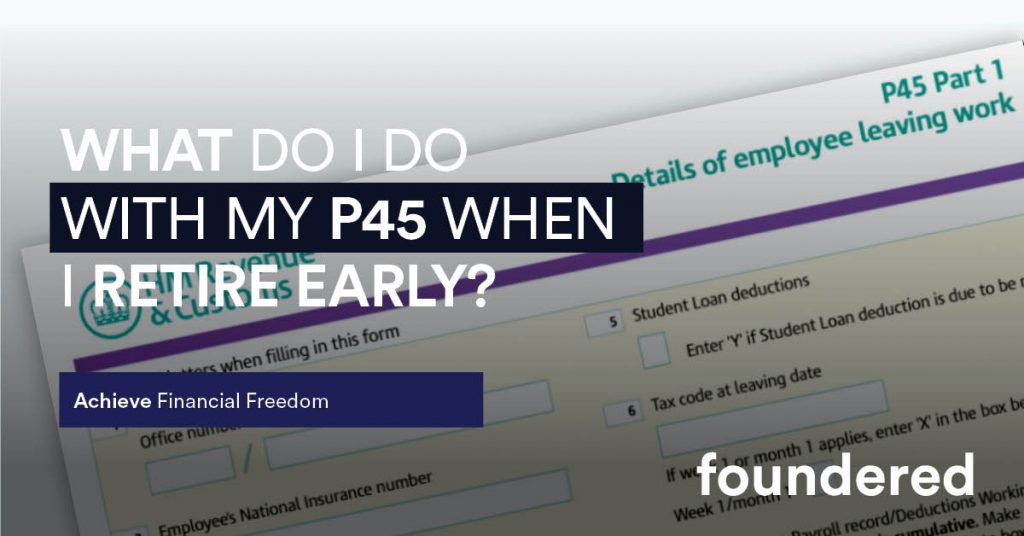So you’re retiring early and amongst the other life admin activities you must complete, dealing with the taxman is up there with the most important! So….you want to know “what do I do with my p45 when I retire early?” The answer is: not a lot. We’ll explain the reasons why below!
What is a P45?
A p45 is a certificate given to an employee at the end of their employment with a company, providing details of their tax code, gross pay, and the tax paid for that year. This p45 certificate is then passed on to their next employer, benefits agency or in the instance of retirement, to their pension provider.
How do I get a p45?
P45 documents aren’t rewarded to you as an employee, they are an official document that you have a right to receive when leaving a company. If you have lost your P45, then you can simply request a new one from your employer and they should provide it to you.
Whenever you stop working for your employer, you’ll receive a P45. This is an official document that you are entitled to when leaving a company.
Your employer sends details for Part 1 to HM Revenue and Customs (HMRC) and gives you the other parts. You give Part 2 and 3 to your new employer (or to Jobcentre Plus if you’re not working). Keep Part 1A for your own records. Source: Gov.uk
Do I need to inform HMRC if I retire early
Your employer and any pension provider will normally tell HM Revenue & Customs (HMRC) when you retire. To prevent a delay that might result in an overpayment or underpayment of tax, you should also tell them.
If you’re self-employed and about to retire, you must always contact HMRC.
HMRC need to know about your income when you retire or reach State Pension age so that they can make sure you:
- receive the right tax-free allowances
- pay the right amount of tax
- stop paying National Insurance contributions
What if I’m self employed?
Well firstly, you’ll not have a p45 if you retire early from self-employment. You will have a self-assessment however. With this in mind, if you are self-employed, it is important to inform the HMRC when you have stopped being self-employed. You can write to the HMRC or use an online form to tell them that you have stopped being self-employed. Do this as soon as this happens to ensure you meet your self-assessment obligations.
Want to achieve financial independence?
You could spend the next 13 years learning about personal finance and putting your knowledge into action. Or you could take my FREE 10 day mini course and weekly emails. I’ll show you exactly how to become financially independent. My only question is, whats stopping you?
Do you still pay National Insurance if you retire early?
To receive a full state pension in the UK you need to have paid 35 years of contributions towards National Insurance.
It is always mindful to get advice on your existing level of contributions when you retire early. This ensures you pay only the appropriate amount. Overpaying beyond 35 years, does not result in greater state pension payments, so there’s no need to do this.
If there are gaps in your National Insurance contributions, you can make up to a maximum of 6 years by paying voluntary contributions. Again check how much more you will receive for doing so, as sometimes the additional payment can take decades to break even, if at all.
If you’re planning early retirement and are planning to earn an income, you may want to consider options for paying class 2 and Class 4 National Insurance through Self Assessment.
You usually pay 2 types of National Insurance if you’re self-employed:
- Class 2 if your profits are £6,725 or more a year
- Class 4 if your profits are £9,881 or more a year
Who keeps my p45 when I retire early?
Unless you are self employed you should receive a P45 from your last employer when you retire. It is up to you to retain this, however, your past employer will also keep a record of this for a period of time following your employment.
For early retirees your p45 will be needed primarily for your tax code. This alongside any withdrawals from your taxable accounts, will equate to your income in this tax year.
For retirees of standard retirement age, your primary pension provider will likely request a copy of your p45 and as with early retirees you’ll need it to keep your tax code, if you make any withdrawals from your pension this financial year.
You may receive a paper copy of your p45 when you leave your employer, but its my advice that you also request a digital copy. Keep this safe and back it up with your other important documents.
What do I need to do before I retire early?
If you’re reading this page, you’re serious about retiring early. Outside of the formalities around your p45 or self assessment noted above, retirement doesn’t just happen. It takes planning and commitment and, yes, money.
Below we’ve outline our early retirement checklist to help you prepare for retirement at any age.
- Set a budget. Stick to it!
- Start saving, keep saving, and stick to your goals
- Contribute to your company pension and avail of the full employer match
- Consider investing in an ISA or in other income generating assets
- Find out about your state pension amount
- Prepare for the other side of work
- Don’t blow your retirement lump sum on a Lamborghini
- Enjoy retirement. You’ve worked hard for it.
The UK Government has some great advice on the matter also. This can be found at – https://www.gov.uk/plan-retirement-income/get-financial-advice
Hopefully we’ve covered everything you need to consider around your p45 when you retire early. If you have any additional notes, or comments, please leave them below and we’ll update the post with anything we’ve missed.
Here’s to your retirement
foundered!
Frequently asked questions
You will get your p45 from your last employer. Keep this, as your primary pension provider will ask for it when you draw your pension. It has relevant information about your tax code and tax paid in this financial year.
Your employer and any pension provider will normally tell HM Revenue & Customs (HMRC) when you retire. There may be a delay in this, which could result in an overpayment or underpayment of tax. To mitigate this as much as possible you may wish to communicate directly with the HMRC.


